专题九 情态动词
- 格式:doc
- 大小:70.50 KB
- 文档页数:7
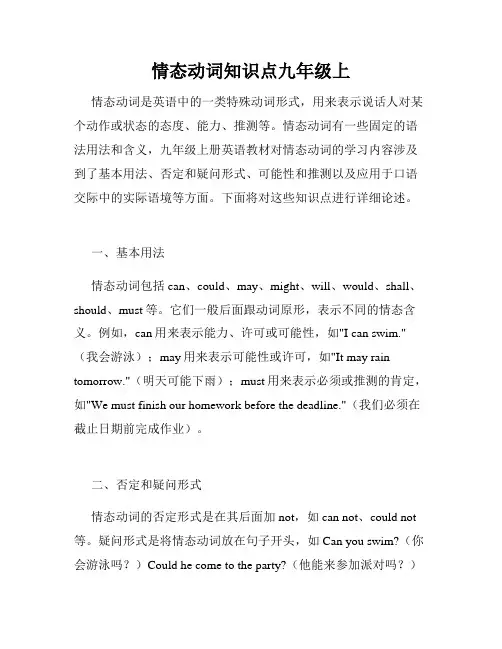
情态动词知识点九年级上情态动词是英语中的一类特殊动词形式,用来表示说话人对某个动作或状态的态度、能力、推测等。
情态动词有一些固定的语法用法和含义,九年级上册英语教材对情态动词的学习内容涉及到了基本用法、否定和疑问形式、可能性和推测以及应用于口语交际中的实际语境等方面。
下面将对这些知识点进行详细论述。
一、基本用法情态动词包括can、could、may、might、will、would、shall、should、must等。
它们一般后面跟动词原形,表示不同的情态含义。
例如,can用来表示能力、许可或可能性,如"I can swim."(我会游泳);may用来表示可能性或许可,如"It may rain tomorrow."(明天可能下雨);must用来表示必须或推测的肯定,如"We must finish our homework before the deadline."(我们必须在截止日期前完成作业)。
二、否定和疑问形式情态动词的否定形式是在其后面加not,如can not、could not 等。
疑问形式是将情态动词放在句子开头,如Can you swim?(你会游泳吗?)Could he come to the party?(他能来参加派对吗?)三、可能性和推测情态动词也被用来表示可能性或推测。
may和might用来表示可能性,常用于猜测或询问某事是否可能发生,如"I may go to the party tonight."(可能我今晚去派对);might还可以表示对过去的推测,如"He might have forgotten his keys."(他可能忘记带钥匙了)。
will和would用来表示根据某种迹象或情况的推测,如"Itwill rain soon. Look at those dark clouds."(天很快就要下雨了,看看那些乌云)。
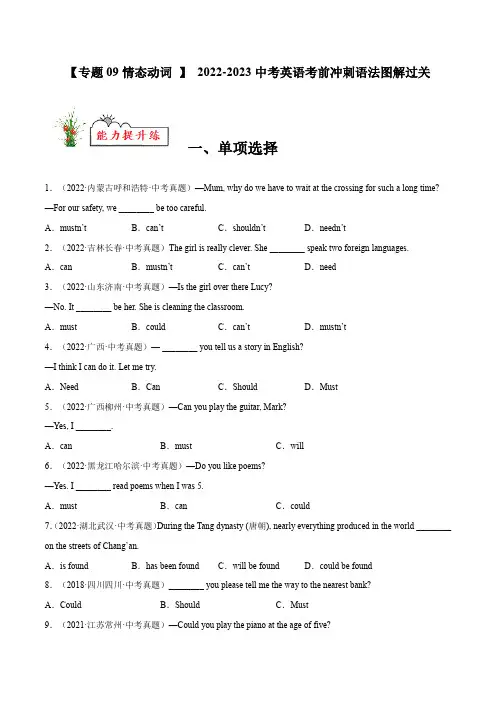
【专题09情态动词】2022-2023中考英语考前冲刺语法图解过关一、单项选择1.(2022·内蒙古呼和浩特·中考真题)—Mum, why do we have to wait at the crossing for such a long time?—For our safety, we ________ be too careful.A.mustn’t B.can’t C.shouldn’t D.needn’t2.(2022·吉林长春·中考真题)The girl is really clever. She ________ speak two foreign languages.A.can B.mustn’t C.can’t D.need3.(2022·山东济南·中考真题)—Is the girl over there Lucy?—No. It ________ be her. She is cleaning the classroom.A.must B.could C.can’t D.mustn’t4.(2022·广西·中考真题)— ________ you tell us a story in English?—I think I can do it. Let me try.A.Need B.Can C.Should D.Must5.(2022·广西柳州·中考真题)—Can you play the guitar, Mark?—Yes, I ________.A.can B.must C.will6.(2022·黑龙江哈尔滨·中考真题)—Do you like poems?—Yes. I ________ read poems when I was 5.A.must B.can C.could7.(2022·湖北武汉·中考真题)During the Tang dynasty (唐朝), nearly everything produced in the world ________ on the streets of Chang’an.A.is found B.has been found C.will be found D.could be found8.(2018·四川四川·中考真题)________ you please tell me the way to the nearest bank?A.Could B.Should C.Must9.(2021·江苏常州·中考真题)—Could you play the piano at the age of five?—No, I ________. I started at six.A.can’t B.shouldn’t C.needn’t D.couldn’t10.(2022·上海·中考真题)—_______ I use your glue? I’m making a kite.—No problem. Here you are.A.Should B.Need C.Must D.May11.(2022·辽宁锦州·中考真题)—Will plants grow on other planets?—That ________ be true. It’s really difficult to predict the future.A.mustn’t B.should C.needn’t D.may12.(2022·湖南邵阳·中考真题)— ________ I use your iPad?—Sorry, I’m using it now.A.May B.Must C.Should13.(2022·辽宁盘锦·中考真题)—I can’t find my dictionary. ________ I use yours?—Sure, here you are.A.Need B.May C.Must D.Should14.(2017·湖南湘潭·中考真题)Andy ________ come to our reading club, but she hasn’t decided yet. A.may B.mustn’t C.will15.(2017·四川遂宁·中考真题)—Listen! I think it ________be Mr. White singing in the office. —No. It ________ be him. He left for London just now.A.must; mustn’t B.may; mustn’t C.must; can’t D.can; can16.(2021·上海·中考真题)—________ I have two tickets for the Chinese Farmers’ Painting Exhibition?—Sorry. The tickets are sold out.A.Must B.Need C.Should D.May17.(2021·青海西宁·中考真题)Children ________ be told not to swim in the river.A.can B.must C.may D.might18.(2022·湖南怀化·中考真题)—Whose English book is this?—It _______ be Lily’s, but I’m not sure.A.might B.can’t C.must19.(2016·内蒙古呼和浩特·中考真题)—where are you going this month?—we ________ go to Xiamen. But we’re not sure.A.needn’t B.might C.must D.mustn’t20.(2019·四川攀枝花·中考真题)—Excuse me, is this the right way to the library?—Sorry, I am not sure. But it ________ be.A.need B.will C.must D.might21.(2017·山东烟台·中考真题)You ______ set out alone, or you ______ get lost in the jungle. A.needn’t, may B.mustn’t, might C.can’t, need D.mustn’t, must22.(2015·新疆·中考真题)—Whose notebook is this?—It ________ be Alan’s. It looks like his.A.must B.can’t C.might D.mustn’t23.(2022·山东青岛·中考真题)—May I go boating with my classmates this weekend?—Of course, but you __________ swim in the river!A.mustn’t B.needn’t C.wouldn’t D.couldn’t24.(2022·江苏南通·中考真题)In the library you ________ draw or write in the books, or you will be fined. A.mustn’t B.needn’t C.wouldn’t D.couldn’t25.(2022·广西河池·中考真题)As we know, sixteen-year-olds ________ drive a car in our country. A.must B.could C.mustn’t D.couldn’t26.(2022·江苏镇江·中考真题)—I don’t care what Kate thinks.—Well, you _______. Her suggestions are of some value.A.would B.should C.might D.could27.(2022·江苏常州·中考真题)To achieve our dream, we ________ rest on what we have done.A.may not B.should not C.need not D.could not28.(2022·贵州黔东南·中考真题)When our parents become too old to take care of themselves one day, they __________ be looked after well by us.A.should B.shouldn’t C.may D.may not29.(2021·四川资阳·中考真题)—Lucy, could you give me some suggestions on reading?—OK. My first suggestion is that you ________ have a good reading habit.A.will B.can C.might D.should30.(2013·湖北武汉·中考真题)--Honey, stay home before I return.---I _______, mum.A.must B.can C.will D.should31.(2022·四川·乐山市教育科学研究所中考真题)— Must we wear the school clothes tomorrow, Mr. Wang?— No, you ________. Only on Mondays. Tomorrow is Tuesday.A.mustn’t B.needn’t C.can’t32.(2022·山东滨州·七年级期末)It’s raining all the morning. I ________ stay at home.A.can’t B.mustn’t C.have to D.may33.(2022·湖北荆州·中考真题)—Mike, I can’t stop playing computer games.—For your eyes, my dear friend, I’m afraid you ________ .A.could B.may C.would D.have to34.(2022·湖北武汉·中考真题)—Alex, come down to play football.—I can’t. Mom said I ________ clean my bedroom before doing anything else.A.had to B.will C.used to D.can35.(2013·湖南长沙·中考真题)—________I have lunch now, Mom?—No. You must wash your hands first.A.Would B.May C.Ought to二、完成句子36.(2021·甘肃甘南·中考真题)请给我买张票好吗?________ you ________ get me a ticket?37.(2022·贵州贵阳·中考真题)骑行能帮助我们节能而且不会污染空气。
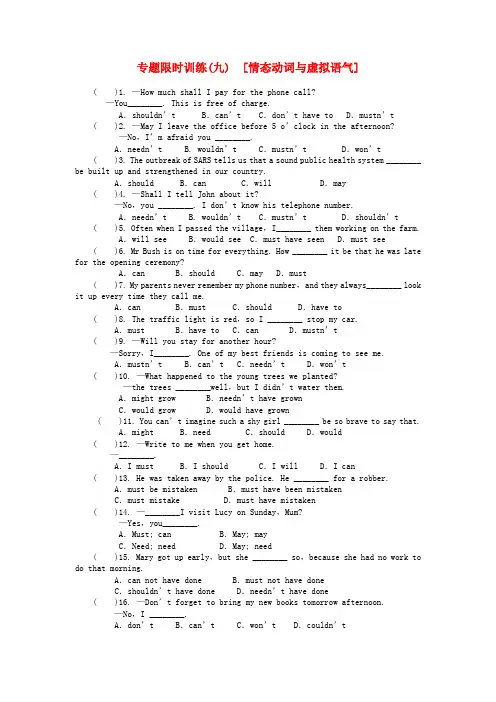
专题限时训练(九) [情态动词与虚拟语气]( )1. —How much shall I pay for the phone call?—You________. This is free of charge.A.shouldn’t B.can’t C.don’t have to D.mustn’t( )2. —May I leave the office before 5 o’clock in the afternoon?—No,I’m afraid you ________.A.needn’t B. wouldn’t C.mustn’t D.won’t( )3. The outbreak of SARS tells us that a sound public health system ________ be built up and strengthened in our country.A.should B.can C.will D.may( )4. —Shall I tell John about it?—No,you ________. I don’t know his telephone number.A.needn’t B. wouldn’t C.mustn’t D.shouldn’t( )5. Often when I passed the village,I________ them working on the farm.A.will see B.would see C.must have seen D.must see( )6. Mr Bush is on time for everything. How ________ it be that he was late for the opening ceremony?A.can B.should C.may D.must( )7. My parents never remember my phone number,and they always________ look it up every time they call me.A.can B.must C.should D.have to( )8. The traffic light is red,so I ________ stop my car.A.must B.have to C.can D.mustn’t( )9. —Will you stay for another hour?—Sorry,I________. One of my best friends is coming to see me.A.mustn’t B.can’t C.needn’t D.won’t( )10. —What happened to the young trees we planted?—the trees ________well,but I didn’t water them.A.might grow B.needn’t have grownC.would grow D.would have grown( )11. You can’t imagine such a shy girl ________ be so brave to say that.A.might B.need C.should D.would( )12. —Write to me when you get home.—________.A.I must B.I should C.I will D.I can( )13. He was taken away by the police. He ________ for a robber.A.must be mistaken B.must have been mistakenC.must mistake D.must have mistaken( )14. —________I visit Lucy on Sunday,Mum?—Yes,you________.A.Must; can B.May; mayC.Need; need D.May; need( )15. Mary got up early,but she ________ so,because she had no work to do that morning.A.can not have done B.must not have doneC.shouldn’t have done D.needn’t have done( )16. —Don’t forget to bring my new books tomorrow afternoon.—No,I ________.A.don’t B.can’t C.won’t D.couldn’t( )17. When a friend of mine gave me a ticket for the game,I________ go.A.couldn’t help B.can’t butC.couldn’t help but D.just have to( )18. —I hear you’ve got a set of Australian coins. ________ I have a look?—Yes,certainly.A.Do B.May C.Will D.Should( )19. There is nothing to do,so I ________ as well go to bed.A.may B.should C.can D.would( )20. He seldom listens to others. He ________ answer for what he has done.A.shall B.will C.can D.would1. C shouldn’t意为“不应该”;can’t意为“不能”;don’t have to意为“不必”;mustn’t意为“禁止”。
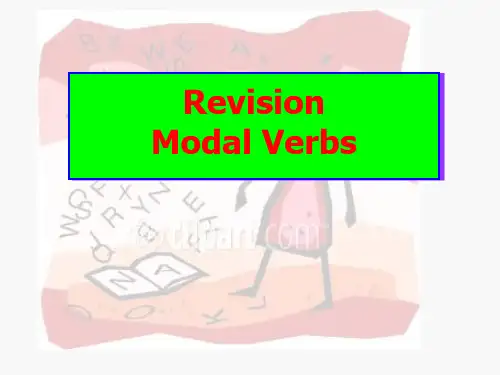
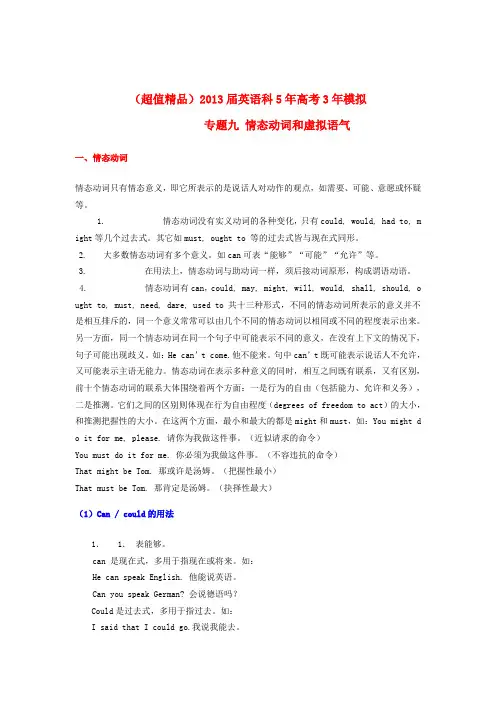
(超值精品)2013届英语科5年高考3年模拟专题九情态动词和虚拟语气一、情态动词情态动词只有情态意义,即它所表示的是说话人对动作的观点,如需要、可能、意愿或怀疑等。
1. 情态动词没有实义动词的各种变化,只有could, would, had to, m ight等几个过去式。
其它如must, ought to 等的过去式皆与现在式同形。
2.大多数情态动词有多个意义。
如can可表“能够”“可能”“允许”等。
3. 在用法上,情态动词与助动词一样,须后接动词原形,构成谓语动语。
4. 情态动词有can,could, may, might, will, would, shall, should, o ught to, must, need, dare, used to 共十三种形式,不同的情态动词所表示的意义并不是相互排斥的,同一个意义常常可以由几个不同的情态动词以相同或不同的程度表示出来。
另一方面,同一个情态动词在同一个句子中可能表示不同的意义,在没有上下文的情况下,句子可能出现歧义。
如:He can’t come.他不能来。
句中can’t既可能表示说话人不允许,又可能表示主语无能力。
情态动词在表示多种意义的同时,相互之间既有联系,又有区别,前十个情态动词的联系大体围绕着两个方面:一是行为的自由(包括能力、允许和义务),二是推测。
它们之间的区别则体现在行为自由程度(degrees of freedom to act)的大小,和推测把握性的大小。
在这两个方面,最小和最大的都是might和must,如:You might d o it for me, please. 请你为我做这件事。
(近似请求的命令)You must do it for me. 你必须为我做这件事。
(不容违抗的命令)That might be Tom. 那或许是汤姆。
(把握性最小)That must be Tom. 那肯定是汤姆。
(抉择性最大)(1)Can / could的用法1. 1.表能够。
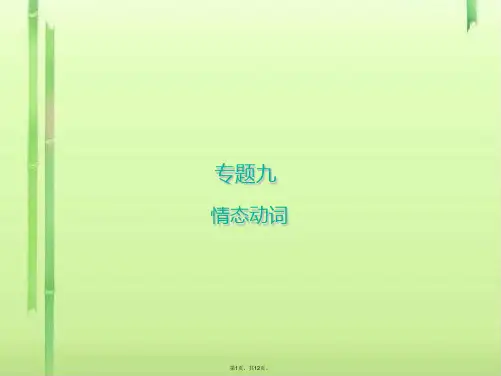
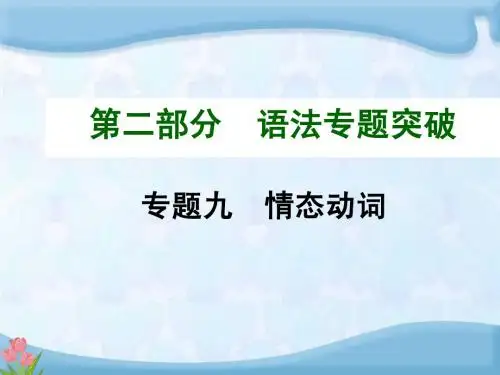
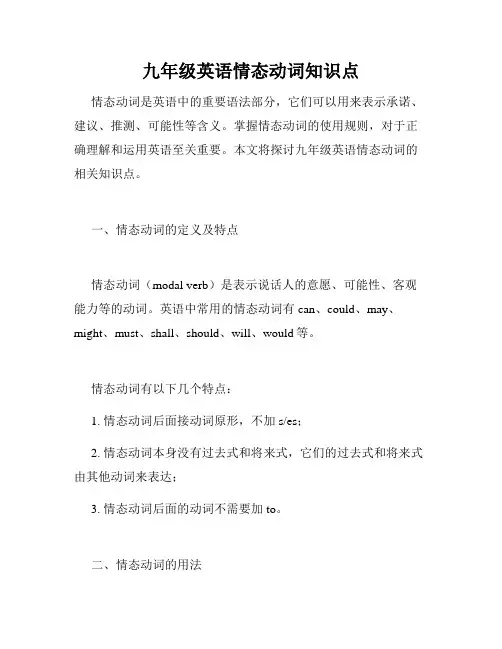
九年级英语情态动词知识点情态动词是英语中的重要语法部分,它们可以用来表示承诺、建议、推测、可能性等含义。
掌握情态动词的使用规则,对于正确理解和运用英语至关重要。
本文将探讨九年级英语情态动词的相关知识点。
一、情态动词的定义及特点情态动词(modal verb)是表示说话人的意愿、可能性、客观能力等的动词。
英语中常用的情态动词有can、could、may、might、must、shall、should、will、would等。
情态动词有以下几个特点:1. 情态动词后面接动词原形,不加s/es;2. 情态动词本身没有过去式和将来式,它们的过去式和将来式由其他动词来表达;3. 情态动词后面的动词不需要加to。
二、情态动词的用法1. 表示能力与许可can和could都表示能力和许可的意思,can表示一般的能力或许可,而could则表示过去或虚拟条件下的能力或许可。
例如:- I can swim.(我会游泳。
)- Could you please lend me your pen?(你可以借给我你的笔吗?)2. 表示推测和可能性may和might表示可能性,may表示可能性较大,might表示可能性较小。
例如:- It may rain tomorrow.(明天可能会下雨。
)- He might be busy.(他可能很忙。
)3. 表示建议和命令should表示建议,而must表示命令或强烈的建议。
例如:- You should take a break.(你应该休息一下。
)- You must finish your homework before dinner.(你必须在晚饭前完成作业。
)4. 表示推测和虚拟条件would常用于if引导的虚拟条件句中,表示与现在或将来相反的假设情况。
例如:- If I were you, I would go to bed early.(如果我是你,我会早点上床睡觉。
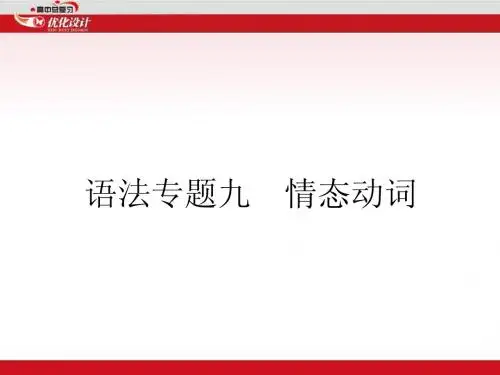
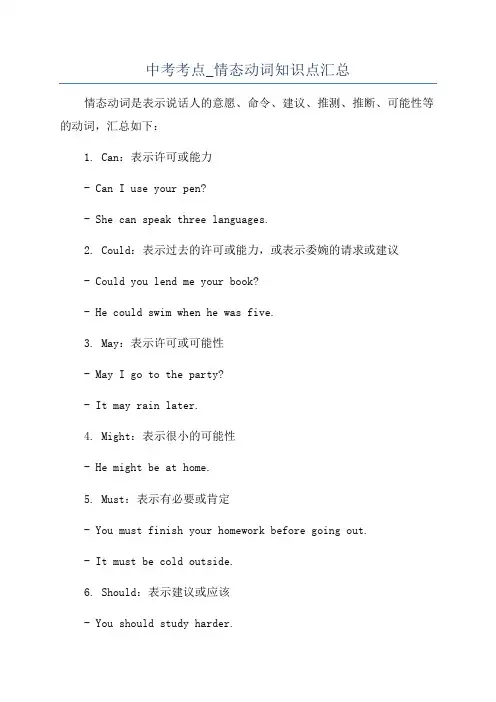
中考考点_情态动词知识点汇总情态动词是表示说话人的意愿、命令、建议、推测、推断、可能性等的动词,汇总如下:1. Can:表示许可或能力- Can I use your pen?- She can speak three languages.2. Could:表示过去的许可或能力,或表示委婉的请求或建议- Could you lend me your book?- He could swim when he was five.3. May:表示许可或可能性- May I go to the party?- It may rain later.4. Might:表示很小的可能性- He might be at home.5. Must:表示有必要或肯定- You must finish your homework before going out.- It must be cold outside.6. Should:表示建议或应该- You should study harder.7. Shall:表示征求意见或提出建议,或用于第一人称的疑问句中- Shall we go to the movies tonight?- What shall I do with this problem?8. Will:表示意愿、意愿、习惯或将来的行动- I will help you with your homework.- She will be here in a few minutes.9. Would:表示过去的意愿或习惯,或表示委婉的请求、邀请或建议- Would you like some tea?- He would always go for a walk after dinner.10. Ought to:表示应该,常用于表达责任或义务- You ought to apologize for what you did.这些是常见的情态动词,掌握它们的用法可以帮助你更准确地表达自己的意图和观点。
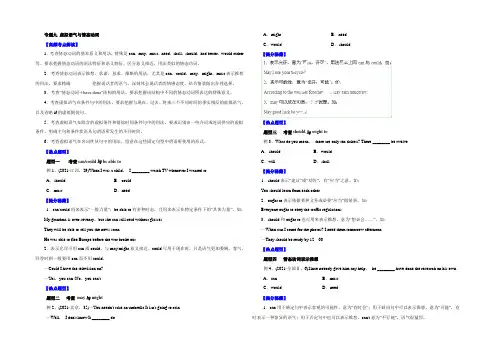
专题九虚拟语气与情态动词【高频考点解读】1.考查情态动词的基本意义和用法,特殊是can,may,must,need,shall,should,had better,would rather 等。
要求把握情态动词的语法特征和语义特征,区分意义相近、用法类似的情态动词。
2.考查情态动词表示推想、承诺、恳求、推断的用法,尤其是can,could,may,might,must表示推想的用法。
要求精确把握说话者的语气,深刻体会说话者的情感态度,结合情景做出合理选择。
3.考查“情态动词+have done”结构的用法。
要求把握该结构中不同的情态动词所表达的特殊意义。
4.考查虚拟语气在条件句中的用法。
要求把握与现在、过去、将来三个不同时间的事实相反的虚拟语气,以及省略if的虚拟倒装句。
5.考查虚拟语气在隐含的虚拟条件和错综时间条件句中的用法。
要求识别由一些介词或连词供应的虚拟条件,明确主句和条件状语从句谓语所发生的不同时间。
6.考查虚拟语气在名词性从句中的用法,留意在这些固定句型中谓语所使用的形式。
【热点题型】题型一考查can/could与be able to例1、(2021·江西,29)When I was a child,I ________ watch TV whenever I wanted to.A.should B.couldC.must D.need【提分秘籍】1.can/could用来表示“一般力量”;be able to有多种时态,且用来表示在特定条件下的“具体力量”。
如:My grandma is over seventy,but she can still read without glasses.They will be able to tell you the news soon.He was able to flee Europe before the war broke out.2.表示允许可用can或could,与may/might意义接近。
专题九情态动词can和would一、情态动词:表示说话人对有关行为或事物的态度和看法,认为其可能、应该或必要等。
情态动词后面加动词原形。
情态动词无人称和数的变化,情态动词后面跟的动词需用原形,否定式构成是在情态动词后面加"not"。
二、can,表示能会,后面接动词原形,如:I can sing. 我会唱歌。
She can dance. 她能跳舞。
(1)有关can的句型:a.肯定句:主语+can+动词原型1.Lingling can ride a horse. 玲玲会骑马。
2.He can speak Chinese.他会说中文。
3.My father can play table tennis.我的爸爸会打乒乓球。
b.否定句:主语+can+not+动词原形1. Lingling can’t ride a horse.2.3.c.一般疑问句及回答:Can+主语+动词原形1.Can Lingling ride a horse? Yes,she can.2.3.d.特殊疑问句:特殊疑问词+can+主语+动词原形1. What can you do? 你会做什么?2. How many birds can you see? 你能看见多少只鸟?3. Who can help me? 谁能帮助我?你还能造出有关can的特殊疑问句吗?练习:1、Can you play ____piano? A、a B、an C、the2、Can you dance? yes, I ____. A、do B、can C、can’t3、Can he Write English? No,he ____ A、can B、can’t C、does4、I __ ride a bike ,but I ____drive a car. A、can , can B、can’t , can’t C、can, can’t5、She can _____basketball . A、play B、playing C、plays三、would是一个情态动词,意思是“愿意”,其后接动词原形;eg: I would stay at home.我愿意呆在家里。
专题九情态动词和虚拟语气1. “I still haven’t thanked Aunt Lucy for her present.” “It’s time you _____.”A. doB. didC. hadD. would2. If I hadn’t been lucky enough to meet you. I really _____ wh at I would have done.A. don’t knowB. hadn’t knownC. wasn’t knowingD. wouldn’t know3. “I’ve told everyone about it.” “Oh, I’d rather you _____.”A. don’tB. hadn’tC. could n’tD. wouldn’t4. It has been raining for a day, but even though it hadn’t rained, we _____ there by tomorrow.A. can’t getB. won’t getC. hadn’t gotD. wouldn’t get5. “Do you kn ow his address?” “No, I also wish I _____ where he _____.”A. knew, liveB. knew, livesC. know, livesD. know, lived6. “Isn’t it about time you _____ to do morning exercises?” “Yes, it is. Would you like to join us?”A. beginB. have begunC. beganD. had begun7. It is hard for me to imagine what I would be doing today if I ____ in love, at the age of seven, with the Melinda Cox Library in my hometown.A. wouldn’t have fallenB. had not fallenC. should fallD. were to fall8. He hesitated for a moment before kicking the ball, otherwise he ____ a goal.A. had scoredB. scoredC. would scoreD. would have scored9. If only he _______ quietly as the doctor instructed, he would not suffer so much now.A. liesB. layC. had lainD. should lie10. With out the air to hold some of the sun’s heat, the earth at night ____ for us to live.A. would be freezing coldB. will be freezing coldlyC. would be frozen coldD. can freeze coldly11. I forget where I read the article, or I _____ it to you now. w.w.w.k.s.5.u.c.o.mA. will showB. would showC. am going to showD. am showing12. “It looks a s if he were drunk.” “So it does. _____.”A. He’d better give up drinkingB. He shouldn’t have drunk so muchC. Health is more important than drinkD. I wonder why he is always doing so13. “Mary looks hot and dry” “So _____ you if you had so high a fever.”A. doB. areC. willD. would14. “He will come tomorrow.” “But I’d rather he _____ the day after tomorrow.”A. will comeB. is comingC. cameD. had come15. All the doctors in the hospital insisted that he ____ badly wounded and that he ____ at once.A. should be; be operated onB. were; must be operated onC. was; should be operatedD. was; be operated on16. ______ smoking, he would not have got cancer in the lung.A. Was he given upB. Had he given up w.w.w.k.s.5.u.c.o.mC. Did he giveD. If he gave up17. “I still haven’t thanked Aunt Lucy for her present.” “It’s time you _____.”A. doB. didC. hadD. would18. “Do you know his address?” “No, I also wish I _____ where he _____.”A. knew, liveB. knew, lives w.w.w.k.s.5.u.c.o.mC. know, livesD. know, lived19. It is hard for me to imagine what I would be doing today if I ____ in love, at the age of seven, with the Melinda Cox Library in my hometown. w.w.w.k.s.5.u.c.o.mA. wouldn’t have fallenB. had not fallenC. should fallD. were to fall20. Without the air to hold some of the sun’s heat, the earth at night ____ for us to live.A. would be freezing coldB. will be freezing coldlyC. would be frozen coldD. can freeze coldly21.________ fired, your health care and other benefits will not be immediately cut off.A. Would you beB. Should you beC. Could you beD. Might you be22.You can’t imagine that a well-behaved gentleman _____ be so rude to a lady.A. mightB. needC. shouldD. would23.—Excuse me. But I want to use your computer to type a report.—You _____have my computer if you don’t take care of it .A. shan’tB. might notC. needn’tD. shouldn’t24. He _____ have completed his work; otherwise, he wouldn’t be enjoying himself by the seaside.A. shouldB. mustC. wouldn’tD. can’t25. I ______ have been more than six years old when the accident happened.A. shouldn’tB. couldn’tC. mustn’tD. needn’t26. There _____ be any difficulty about passing the road test since you have practiced a lot in the driving school.A. mustn’tB. shan’tC. shouldn’tD. needn’t27. I was on the highway when this car went past fol. Lowed by a police car. They______ at least 150 kilometers an hour.A. should have been doingB. must have been doingC. could have doneD. would have done28. —I’ve taken someone else’s green sweater by mistake.—It ______ Harry’s. He always wears green.A. has to beB. will beC. mustn’t beD. could be29. — Catherine, I have cleaned the room for you.— Thanks. You ______ it. I could manage it myself.A. needn’t doB. needn’t have doneC. mustn’t doD. shouldn’t have done30. —Lucy doesn’t mind lending you her dictionary.—She _______. I’ve already borrowed one.A. can’tB. mustn’tC. needn’tD. shouldn’t反思:与现在相反用过去式,与过去相反用完成式!。
语法专题九情态动词和虚拟语气[考点解析]一情态动词1.can与culd的用法表示“能力, 许可, 可能性等. 在口语中can可以代替may表示许可, 而may比较正式;could可以代替can, 表示语气较为婉转. 例如:He is only four, but he can read.Can/ Could/May I come in?Can the news be true?2.may与might的用法表示许可或征询对方许可, 有“可以”的意思. 用作此意时, 它的否定形式可以用may not;但表示“不可以, 禁止, 阻止”等时常用must not(mustn’t)代替may not. 例如:You may go now. He said that I might use the telephone.---May I watch TY after supper? ---Yes, you may./No, you mustn’t(may not/had better not).表示可能性, 有或许, 可能”的意思, may或might+动词原形都可以表示可能性. 用might 则语气更加不肯定. 例如:They may/might have a lot of work to do.3.must与have to的用法must表示“必须, 应该”. 否定形式must not(mustn’t)表示“不应该, 不许可, 不准, 禁止”等. 在回答must的问句时, 否定式常用need not(needn’t)或don’t have to表示“不必”. 而不用must not, 因为must not表示“不可以”. must表示“一定, 必定”等推测意义时, 一般只用在肯定句中. 例如:The work must be finished as soon as possible.---Must I be home before eight o’clock?---Yes, you must./ No, you needn’t(don’t have to).Have to表示“必须, 不得不”, 在这个意义上与must很接近, 但must表示的是说话人的主观看法, 而have to表示的却是客观需要. have to比must有更多的形式. 例如:The TV set is broken. I have to buy a new one.The students will have to know how to use the computers.4.shall与should的用法在疑问句中, shall用来征询对方意见或请求指示, 用于第一, 三人称. should作为情态动词, 表示“劝告, 建议”, 常译作“应该”. 例如:Where shall I wait for you? You should keep your promise5.will与would的用法will表示“意志, 意愿”, 可用于多种人称, 在疑问句中用于第二人称, 表示询问对方的意愿或向对方提出请求. would是will的过去式, 表示过去时间的“意志, 意愿”, 可用于多种人称. 若表示说话人的意愿或向对方提出请求, 语气比will婉转, 指现在时间. 例如:I will tell you all about it. He won’t go with us.Would you like some coffee?6.need的用法用作情态动词时, need表示“敢; 敢于”, 主要用于疑问句, 否定句和条件从句中, 一般不用于肯定句. 例如:You needn’t come so early7.dare的用法dare用作情态动词时, 和need一样, 也是主要用于疑问句, 否定句和条件从句中. 例如: He daren’t speak English before such a crowd, dare he?8.ought to的用法ought to表示“应该” (与should同义, 只是语气稍重一些), 也可表示推测. 例如:You ought to take care of him. He ought to be home by now.ed to的用法表示过去的习惯动作或状态(现在已不复如此).例如:---Did you use to go there to see your brother? /Used you to go there to see your brother?---Yes, I did(used to). /No , I didn’t (usedn’t)10.had better的用法表示“最好(做……)”. 例如:We had better go now. Breakfast had better be eaten before 8 o’clock.情态动词用法归纳:二虚拟语气虚拟语气在虚拟条件中的运用(1)表示与现在事实完全相反的假设用以表示与现在事实相反的假设或现在实现可能性不大的情况. 条件从句用动词过去式(be 多用were), 主句用would/should/could/might+动词原形. 例如:If I were a bird, I could fly.如果我是一只鸟儿的话, 我就能飞了.(2)表示与过去事实完全相反的假设条件从句用had+过去分词, 主句用would/should/could/might+ have+过去分词. 例如:It we had started earlier, we should not have missed the train.如果我们早点出发, 就不会错过这列火车了.(3)表示与将来情形相反的假设或极少有可能实现的情况条件从句用动词过去式, should+动词原形, were to+动词原形, 主句动词用would/should/could/might+动词原形. 例如:If Professor Li should have time tomorrow, we could ask him questions.如果李教授明天有时间的话, 我们就可以问他问题了.书面语中, 上述三种时态的虚拟句中, 如果从句里含有should, had, were或其他助动词, 则可将从属连词if省去, 将助动词或情态动词放在句首形成部分倒装. 例如:Were he in your position, he’d have done the same.如果他在你的位置上, 他也会那么做的.2.错综时间虚拟句通常情况下, 在非真实条件句中主句和从句的谓语动词所指时间是一致的, 但有时也可能指不同的时间, 这时要根据上下文的意思采用不同的谓语动词形式, 例如;(1)If I were you, I would have taken his advice. (从句指现在, 主句指过去)如果我是你的话, 我就接纳他的建议.(2)If I had taken my raincoat with me this morning, I would not be wet now. (从句指过去, 主句指现在)如果今天早上带上雨衣的话, 我现在就不会淋湿了.3.含蓄条件句有时假设的情况并不以条件从句表示, 而是暗含在上下文中, 比如通过介词短语来表示. (1)But for your advice, I could not have done it so successfully.要是没有你的建议, 我就不会成功(2)The changes could not have taken place without the open-door policy.要是没有开放政策, 就没有这些变化.(3)I was so busy then, otherwise, I would have gone to help him.那时我太忙了, 否则我就去帮他了.4.虚拟语气在某些从句中的应用(1)在wish, suggest, order, demand, propose, command, request, require, insist, desire, urge动词的宾语从句以及would rather后, 要用“(should)+动词原形”来表示愿望, 建议, 命令, 要求等; 由上述动词派生或转化的名词的同位语从句或表语从句中也要用相应的虚拟形式.像suggestion, proposal, plan, motion, recommendation, demand, order, desire, request, requirement, insistence, advice, decision等词.(2)在It is/was+某些形容词+that从句的句型中, that从句中的谓语动词常用虚拟语气, 即“should+动词原形”表示惊奇, 遗憾, 怀疑, 不满等。
专题九情态动词(一)中考备考指引1.概念情态动词是表示说话人的情绪、态度或语气的动词,本身有一定的词义,但不能单独作谓语,要和其他动词原形一起构成谓语部分。
常见的情态动词有:can 能/may, might能够/will, would(表意愿)/need需要/dare敢/must必须/have to不得不/shall,should应该/ought to应该(表义务)……2.情态动词的语法特征(1)不能表示正在发生或已经发生的事情,只表示期待或估计将要发生的事情。
(2)后接动词原形。
(3)没有人称和数的变化。
(4)没有非谓语动词形式,即没有不定时、分词等形式。
【注意】①must, can(could), may(might),ought to只做情态动词。
②need,dare既可作情态动词又可作实义动词。
③shall(should), will(would)既可作情态动词又可作助动词。
④has/ have/ had to, used to, had better也具有情态动词的特征。
(二)考点精讲解析(使用及注意事项)考点1 情态动词(1)can和could表示水平、可能性、怀疑或推测(限于否定句、疑问句或感叹句中)和允许。
【注意】could用于一般疑问句中比can语气更委婉,属于现在的情况。
如:The radio is pretty loud. Could you please turn it down a bit?(2)may 和might表示允许、推测(用于肯定句)、请求或规劝和祝愿。
(3)must和have to①must表示义务或责任、很有把握的推测(用于肯定句)和禁止(mustn’t)。
②must是说话人的主观看法,而have to则强调客观需要。
must只有一般现在时,have to有多种时态形式。
③must的否定形式:mustn’t表示“不准”④由must构成的一般疑问句,否定回答用needn’t或don’t have to(不必)。
如:—Must we hand in our exercise books now?—No, you needn’t. / No, you don’t have to.(4)should和ought to①表示“应该”,ought to表示义务或责任,比should语气重。
②表示劝告、建议和命令。
should和ought to可通用,但在疑问句中常用should。
(5)shall和should①表示允许或命令(常用于第二、第三人称)。
②表示征求意见(常用于第一、第三人称的疑问句中)。
(6)will和would表示意愿或决心、有礼貌的请求、习惯动作和预言。
(7)need1)作情态动词时,用于否定句和疑问句中,在肯定句中用must,have to, ought to或should。
如:○1—Need I go with her?—Yes, you must./ No, you needn’t.○2You needn’t worry about it because it’s not your fault.○3We needn’t do it again, need we?2)作实义动词时,后接to do,表示与主语的关系是主动的,若与主语的关系是被动的,则接doing或者to be done。
如:○1You don’t need to do it by yourself.○2The table needs painting./ the table needs to be painted.(8)had better表示“最好,应该”,后接动词原形,had通常缩写为’d;否定形式是:had better not。
如:○1You’d better sit here and have a rest.○2You’d better not tell lies any more.(9)used to表示“过去经常”,to是不定式符号,不是介词,所以后面接动词原形(不接动名词)。
如:○1My mother used to tell us stories when we were children.○2Did you use to play with your friends after school?○3You didn’t use to drink.考点过关精炼()1. —Look at that girl! Is it Susan?—No, it _____ be her. She has gone back to her hometown.A. mustn’tB. can’tC. needn’tD. wouldn’t()2. They ____ play football last Friday because Simon forgot to bring his football here.A. couldB. couldn’tC. can’tD. can()3. —What will the weather be like tomorrow?—It ____ be rainy ,cloudy or sunny. Who knows?A. mustB. mightC. shallD. should考点2三组情态动词的用法区别(1)must与have to两者都表示“必须”,但强调的重点不同:must侧重于说话者的主观看法,认为有必要或有义务去做某事;have to 侧重于客观需要,含有“不得不”或者“被迫”之意。
如:My brother was very ill, so I had to call the doctor in the middle of the night.(2)can与be able to○1can只有两种时态形式,现在式can和过去式could, 而be able to有多种时态形式。
如:I can swim. I have been able to swim since I was six.○2be able to可用将来时态表示某人将来具备的水平,而can不能用于将来时态。
但表示现在决定将来是否有水平做某事时,可用can。
如:I can help you tomorrow.(3)can’t与may not1)can’t有两个意思:若表示水平,意为“不能”;若表示推测,意为“不可能”。
如:○1I can’t sing that song in English.○2It can’t be ture.2)may not也有两个意思:若表示许可,意为“不能够”;若表示推测,意为“可能不”。
如:○1You may not smoke here.○2They may not have known it beforehand.专题十非谓语动词(一)中考备考指引非谓语动词常指动词不定式(to do)、动名词(doing)和分词(doing,done),在句中不能单独作谓语,但仍保留动词的某些特征。
所以,非谓语动词在句中可作主语、宾语、定语、状语、表语等。
(二)考点精讲精析(使用及注意事项)非谓语动词常见的搭配如下:考点1 谓语动词 + to do(否定:not to do)的形式。
如:want to do, offer to do, decide to do, agree to do, hope to do, refuse to do, manage to do, choose to do, promise to do……考点过关精炼()1. Tony wants ____ a job as a language teacher in China.A. to findB. findingC. findD. found()2. What bad weather it was! We decided ____.A. to go outB. not to go outC. to not to go outD. not going out考点2谓语动词 + sb./ sth. + to do(否定:not to do)的形式。
如:ask sb. to do, allow sb. to do, invite sb. to do, tell sb. to do, want sb. to do. Persuade sb. to do, teach sb. to do, force sb. to do……考点过关精炼()1. My mother asked me ____ the room.A. cleanB. cleansC. to cleanD. cleaning()2. Father often tells me ____ too much time on computer games.A. don’t spendB. not spendC. not to spendD. not spending考点3谓语动词 + doing的形式如:finish doing, enjoy doing, consider doing, practice doing, mean doing, miss doing, avoid doing, suggest doing, admit doing, give up doing, be used to doing, look for ward to doing, keep (on) doing, be busy doing, insist on doing……考点过关精炼()1. English is very important, so I practice ____ it very hard.A. speaksB. to speakC. speakingD. speak()2. Most of the young people enjoy ____ Jay Chou’s songs.A. singsB. sangC. singingD. to sing考点4当谓语动词是使役动词时,其形式是:谓语动词 + sb./ sth. + do(否定:not do)如:let sb. do, make sb. do, have sb. do, help sb. do (to do)……考点过关精炼()1. The woman made his son ____ finally after she told him some jokes.A. laughedB. to laughC. laughD. laughing()2.The assistant won’t let you ____ the cinema if youhaven’t a ticket.A. enterB. to enterC. enteringD. entered考点5 有些谓语动词之后既能够加动词不定式to do的形式,也能够加动名词doing的形式,但是它们的中文意思不同。